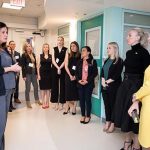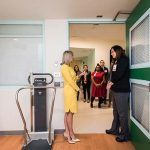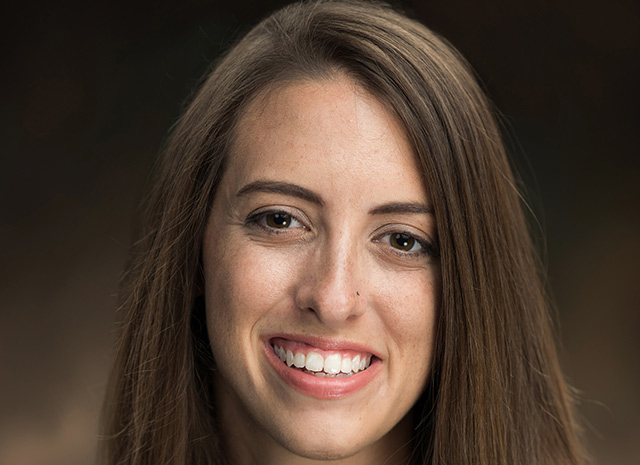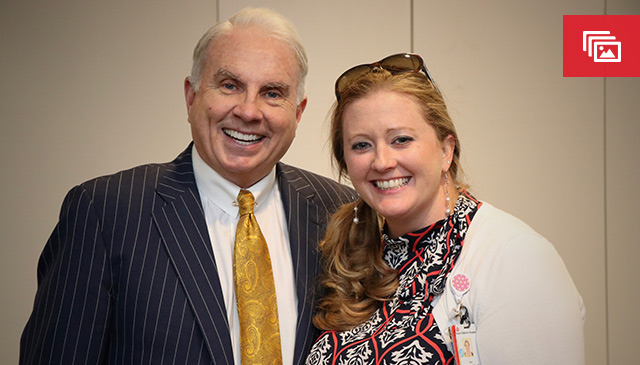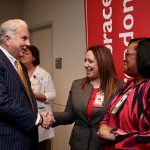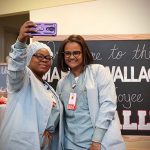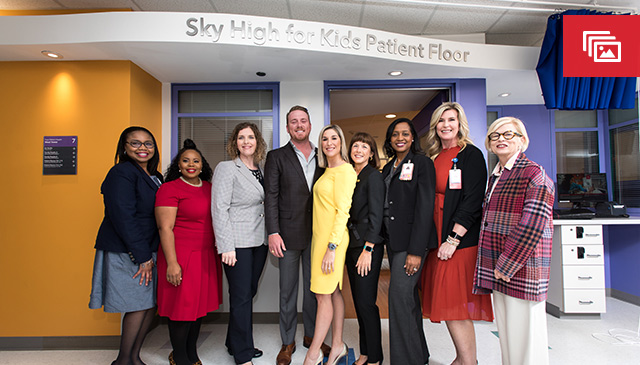
On February 13, Texas Children’s Cancer and Hematology Centers hosted a special celebration to unveil the new Sky High for Kids Immunotherapy Center that will officially open on 7 West Tower next month.
Texas Children’s Cancer Center staff, physician and nursing leaders, and invited guests attended the unveiling ceremony which began with a special blessing of the new oncology-hematology unit from Texas Children’s Chaplain Pam Krinock followed by remarks from Dr. Susan Blaney, director of Texas Children’s Cancer and Hematology Centers, and Brittany Hebert, Founder/CEO of Sky High for Kids.
“The Sky High for Kids Immunotherapy Center is a tremendous advance, that will be essential to achieving our goal of curing cancer in each and every child,” Blaney said. “We, along with our patients and their families, are grateful for our partnership with Sky High for Kids. This partnership is incredibly strong, because the founders and leaders of Sky High are equally driven and passionate as we are about caring for children who are diagnosed with cancer and eliminating this disease as quickly as possible.”
In 2018, Sky High for Kids committed $20 million over 15 years to Texas Children’s Hospital to establish the Sky High for Kids patient floor and the nation’s first Immunotherapy Center, along with supporting Texas Children’s Global HOPE initiative to improve pediatric cancer treatment in sub-Saharan Africa. This pledge will provide Texas Children’s with the necessary resources to continue our research and application of immunotherapy treatments, impact around the globe and quality of care and comfort for our patients.
“The Sky High for Kids patient floor is poised to serve children across Texas, in the United States, and ultimately around the world,” Hebert said. “We are grateful to be part of the Texas Children’s family and are honored to be a part of leading the charge to eradicate cancer right here in our hometown.”
After the unveiling ceremony, guests had the opportunity to tour the new Sky High for Kids patient floor on 7 West Tower, which will officially open on Wednesday, March 25. The spacious, state-of-the-art patient care floor includes 22 hematology-oncology rooms and 10 bone marrow transplant rooms. The newly renovated spaces also feature a multidisciplinary work area for the health care teams, larger family lounge and respite areas, a laundry room, and a beautiful art studio for patients and their families.
As Texas Children’s Cancer Center continues to pioneer new and emerging therapies for patients with cancer and blood disorders, the need for additional inpatient accommodations was crucial. The new space will allow care teams to better meet the needs of our patients while continuing to provide the highest quality care.
“We are very excited about the opening of our new oncology and hematology unit, and are very fortunate to have the best and brightest minds, dedicated to finding a cure for childhood cancer,” Blaney said. “Everyone in our Cancer Center, including our physician scientists, our research technicians, our clinical researchers, and the entire medical team, feel a tremendous sense of urgency to attaining this goal.”
Click here to learn more about Texas Children’s Cancer and Hematology Centers. Click here for more information about our philanthropic partner, Sky High For Kids, and their mission to end pediatric cancer.










